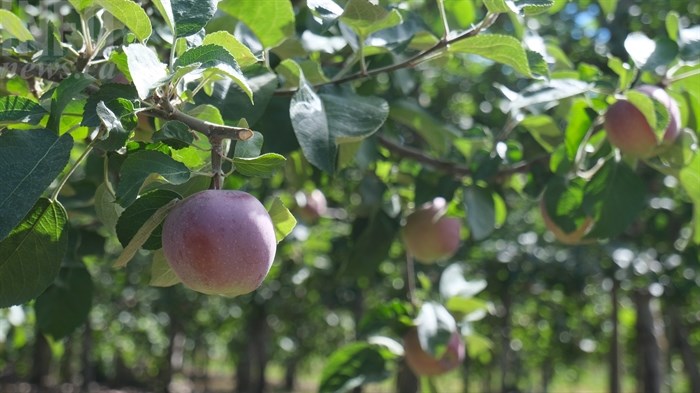
(CARLI BERRY / iNFOnews.ca)
May 30, 2021 - 7:00 AM
A lack of honeybees and a labour force to distribute them means some orchardists are not seeing the same number of beloved pollinators this season.
“There’s been sort of a downward spiral in the availability and health of commercial bees available for delivery into orchards,” said Penticton beekeeper Kevin Dunn, who has been in the commercial beekeeping industry with his wife Janelle for 20 years, serving the South Okanagan. “This year the biggest difference was the shortage of bees.”
Dunn has roughly 220 bee hives and noted the Okanagan Valley doesn’t have enough land for large numbers of bee hives, compared to bee keepers in the prairies. In the Peace River region, operators will have 2,000 to 10,000 colonies so Okanagan beekeepers will also lease beehives from the prairies in addition to having their own hives to supply orchardists, Dunn said.
READ MORE: Feds won’t ban pesticides deadly to bees, bugs and their ecosystems
This year, they had to get their bees from Manitoba and Armstrong, because the two main operators they rely on to lease hives from the Peace River region suffered catastrophic losses over the winter, losing between 65 to 70% of their hives, Dunn said. The cause of the losses are still unknown.
“You could imagine the panic in the spring where everyone said ‘wow, there really aren't enough bees here to do the job,'” he said.
“On top of that, we’re in an extreme labour shortage,” he said, adding there are few local people who have skills in commercial beekeeping, and rely on labour from other countries that has been drastically reduced due to COVID-19 travel restrictions.
The Manitoba beekeeper would normally bring between 1,500 to 2,000 colonies to service growers in Kelowna, but last year he told the growers and beekeepers that 2021 would be his last year, Dunn said.
“So now you’re going to having a huge gap in the number of bee hives available for pollination in the Kelowna area. And so the health of bee hives is hard to upkeep, you have operators pulling out, you have lack of labour, it has to be recognized by the growers especially, that we pull out all the stops for them, just to get beehives into their orchards,” Dunn said.
Commercial honeybees provide a crucial pollination service for orchardists in the Okanagan. Orchardists require millions of pollinators during a critical short window of time for fruits like cherries and there aren’t enough natural pollinators to provide the service due to the lack of habitat for them, Dunn said.
Getting several thousand bee hives is something you can’t just snap your fingers and get, Dunn said.
“It’s going to be very challenging (moving forward), what we hope for is maybe a third operator that we can work with in the south. We will be putting out some feelers, but at the end of the day, Janelle and I can only do so much and we’re going to be cutting back the amount we do and focus more on quality than numbers and prices will reflect the true costs of beekeeping.”
“The demand for bees has gotten much higher, because the understanding of the need for pollinators has come to light,” Dunn said.
He said growers shouldn’t be mowing dandelions and there needs to be more dialogue among beekeepers and growers of what’s coming down the pike.
“If growers are waiting until next spring, and they go to order bees and we say ‘sorry, first come first serve’ and there’s nothing, what are they going to do? And that happened this year already, and next year it’s going to be even worse. We can only provide so much, it’s not an endless supply.”
There also needs to be an understanding of what types of sprays used by orchardists are really dangerous to bees, he said.
B.C.’s top beekeeper, Paul van Westendorp. said the province’s coastal beekeepers saw unusually high bee colony losses this year.
A survey was conducted which found the biggest reason was the Varroa destructor, a mite that has been wreaking havoc on honeybee colonies for decades. The mites transfer bee virus to hives that have a long-lasting effect on the bees.
While there’s more honey bee colonies under management across Canada than ever before, the cost of operation has increased in the last few decades, van Westendorp said.
The economic returns of commercially operated bee hives have declined and the result is the commercial beekeepers have expanded operations to make their companies economically viable, he said.
Next year could be a better year for bees, and this year’s bee colony numbers doesn’t signify a long-term trend in winter losses for bees, he said.
In B.C., there’s about 55,000 to 58,000 bee colonies but most are operated by small scale beekeepers or hobbyists so there is a reliance on out-of-province beekeepers from across the country that will bring their bees to B.C. for winter to create stronger colonies in addition to providing hives for the fruit industry.
“There is only a certain sector of the entire 58,000 that are actually used for purposes the crop pollination,” he said.
Bee poisoning as a result of exposure to insecticides is relatively uncommon in B.C. and the province doesn't consider it to be an acute problem, he said.
He believes beekeepers will find ways to overcome the challenges they face, he said.
To contact a reporter for this story, email Carli Berry or call 250-864-7494 or email the editor. You can also submit photos, videos or news tips to the newsroom and be entered to win a monthly prize draw.
We welcome your comments and opinions on our stories but play nice. We won't censor or delete comments unless they contain off-topic statements or links, unnecessary vulgarity, false facts, spam or obviously fake profiles. If you have any concerns about what you see in comments, email the editor in the link above.
News from © iNFOnews, 2021